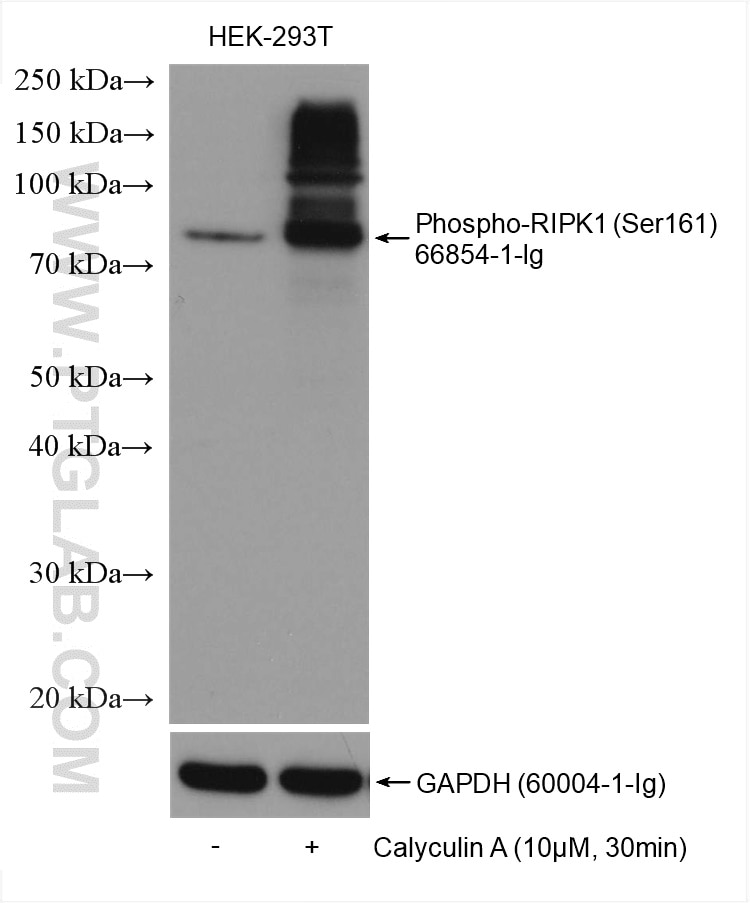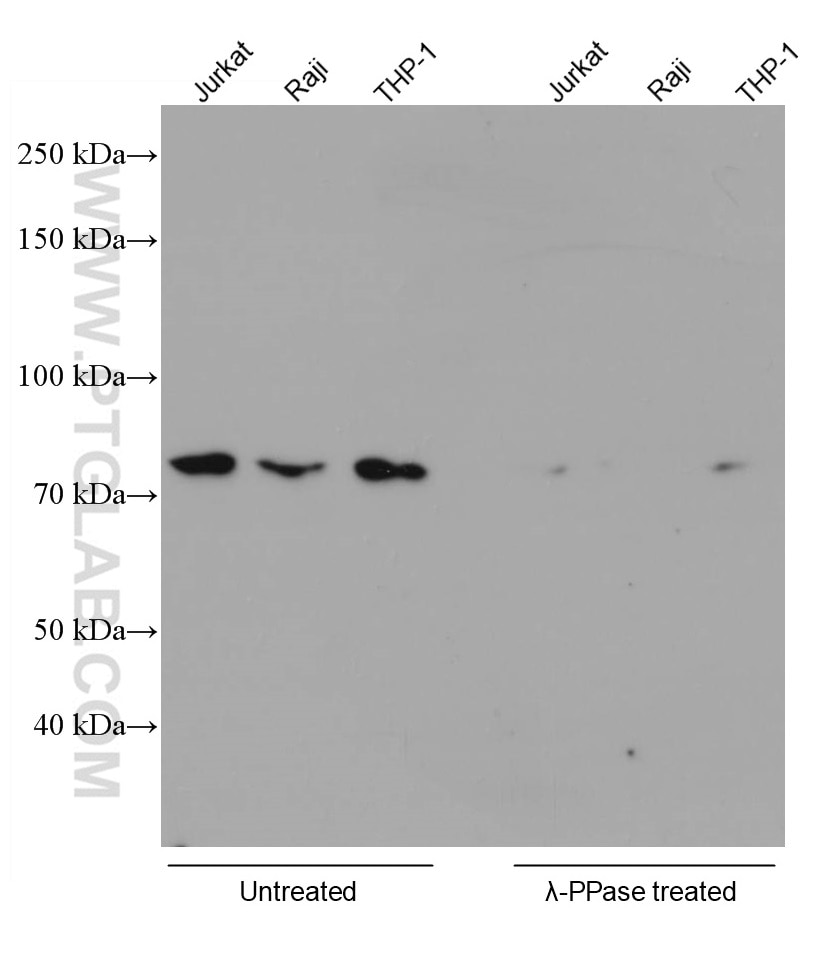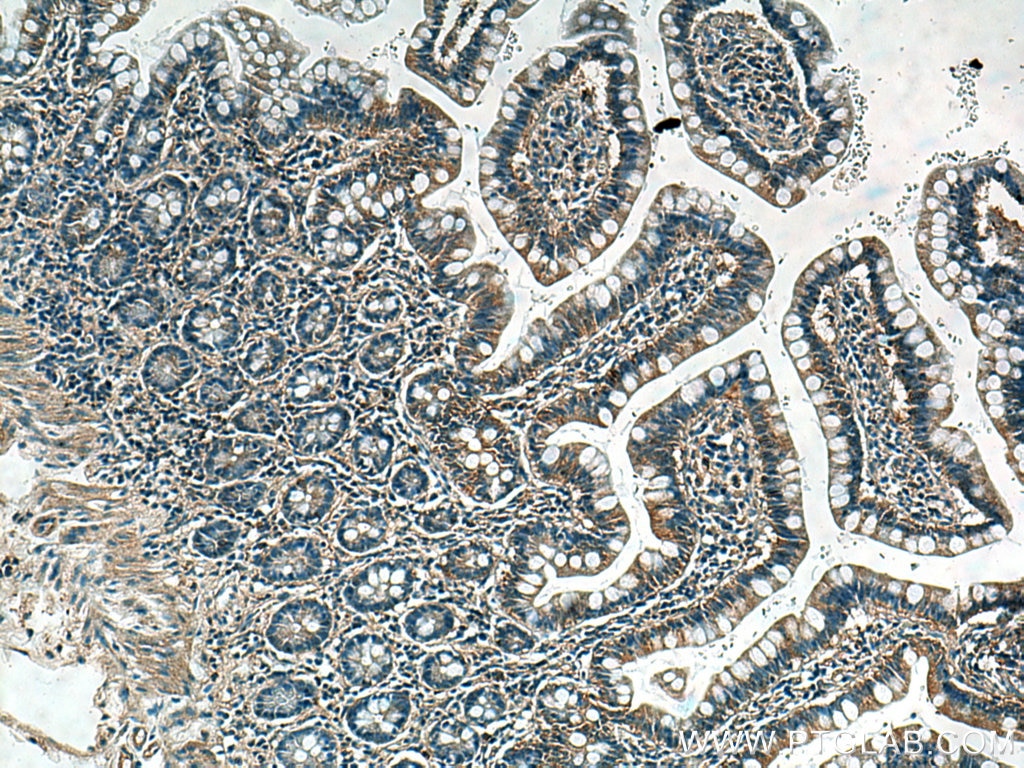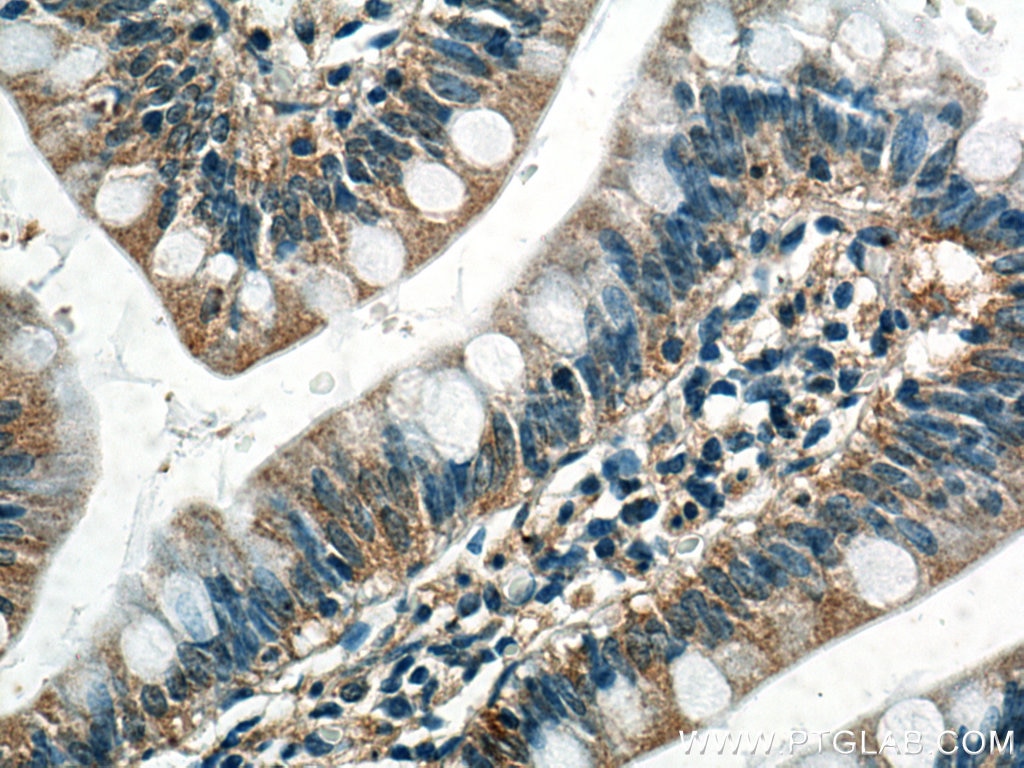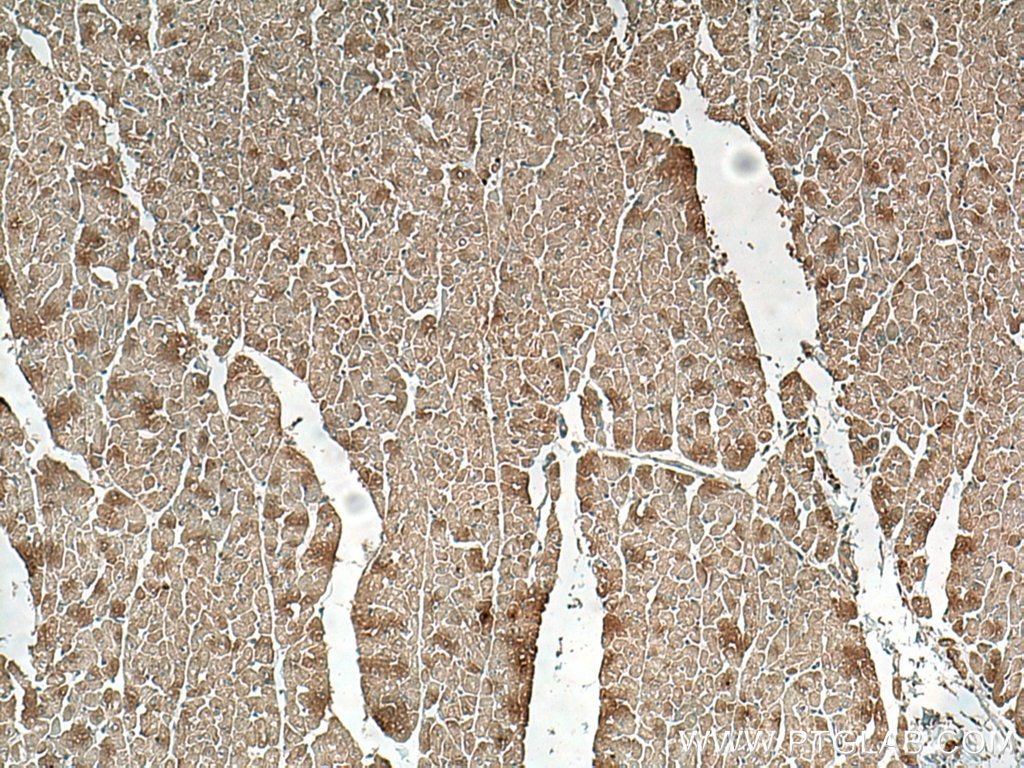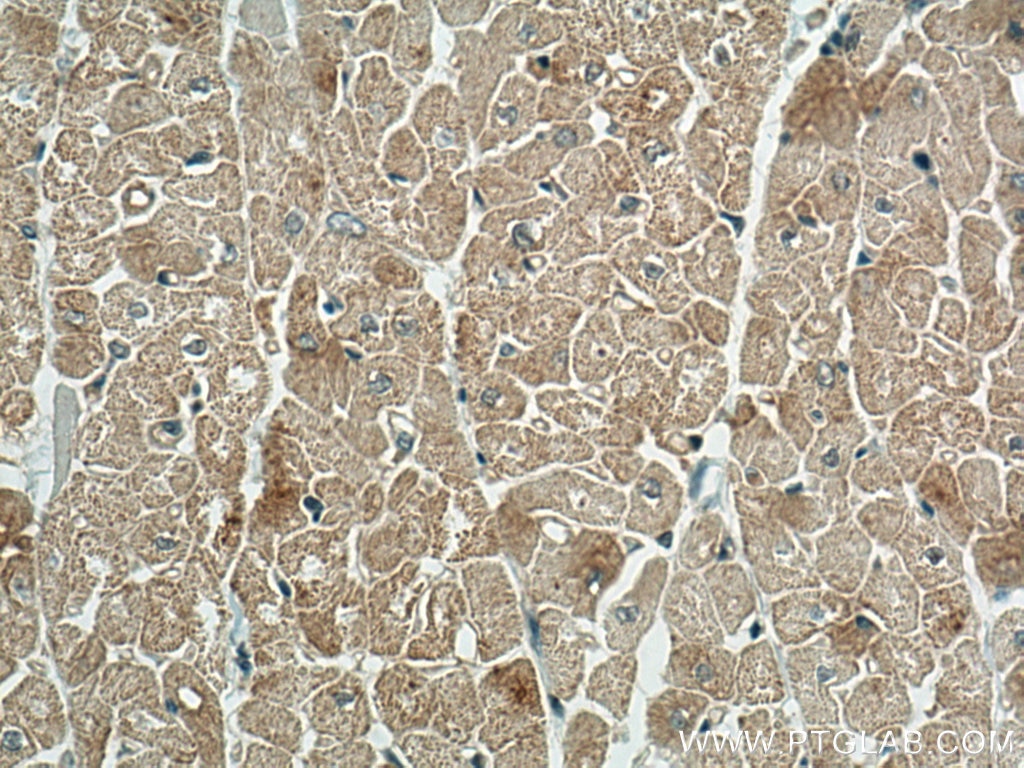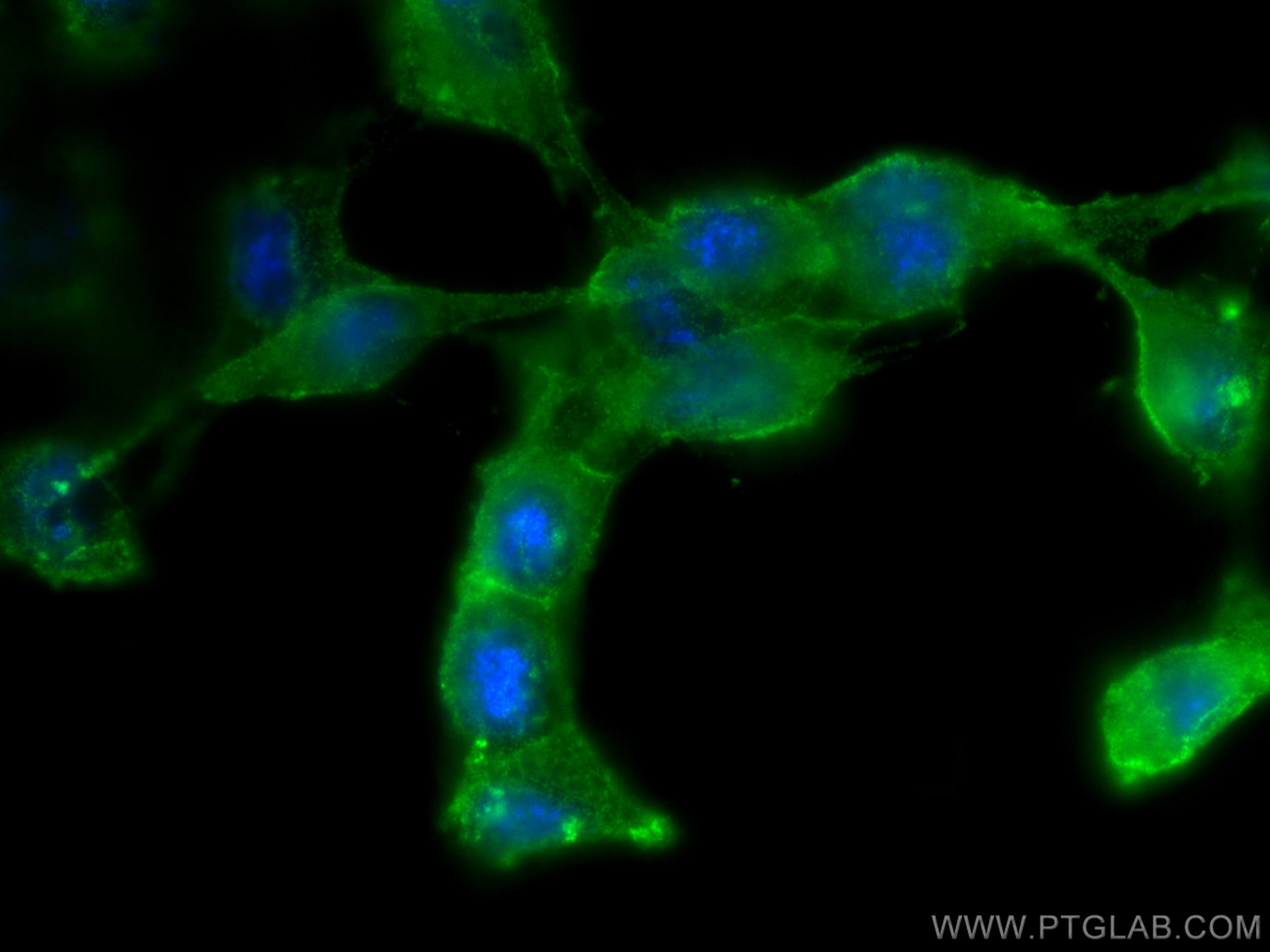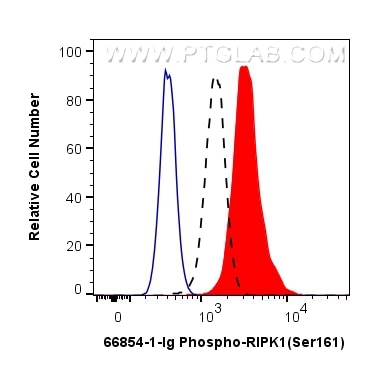Anticorps Monoclonal anti-Phospho-RIPK1 (Ser161)
Phospho-RIPK1 (Ser161) Monoclonal Antibody for FC, IF, IHC, WB, ELISA
Hôte / Isotype
Mouse / IgG1
Réactivité testée
Humain et plus (1)
Applications
WB, IHC, IF, FC, ELISA
Conjugaison
Non conjugué
CloneNo.
1B2G1
N° de cat : 66854-1-Ig
Synonymes
Galerie de données de validation
Applications testées
| Résultats positifs en WB | cellules Jurkat, cellules HEK-293T traitées à la calyculine A, cellules Raji, cellules THP-1 |
| Résultats positifs en IHC | tissu d'intestin grêle humain, tissu cardiaque humain il est suggéré de démasquer l'antigène avec un tampon de TE buffer pH 9.0; (*) À défaut, 'le démasquage de l'antigène peut être 'effectué avec un tampon citrate pH 6,0. |
| Résultats positifs en IF | cellules U2OS, |
| Résultats positifs en cytométrie | cellules HEK-293T traitées à la calyculine A, |
Dilution recommandée
| Application | Dilution |
|---|---|
| Western Blot (WB) | WB : 1:2000- 1:20000 |
| Immunohistochimie (IHC) | IHC : 1:250-1:1000 |
| Immunofluorescence (IF) | IF : 1:200-1:800 |
| Flow Cytometry (FC) | FC : 0.13 ug per 10^6 cells in a 100 µl suspension |
| It is recommended that this reagent should be titrated in each testing system to obtain optimal results. | |
| Sample-dependent, check data in validation data gallery | |
Applications publiées
| WB | See 8 publications below |
| IHC | See 1 publications below |
Informations sur le produit
66854-1-Ig cible Phospho-RIPK1 (Ser161) dans les applications de WB, IHC, IF, FC, ELISA et montre une réactivité avec des échantillons Humain
| Réactivité | Humain |
| Réactivité citée | Humain, souris |
| Hôte / Isotype | Mouse / IgG1 |
| Clonalité | Monoclonal |
| Type | Anticorps |
| Immunogène | Peptide |
| Nom complet | receptor (TNFRSF)-interacting serine-threonine kinase 1 |
| Masse moléculaire calculée | 76 kDa |
| Poids moléculaire observé | 74 kDa, 45 kDa |
| Numéro d’acquisition GenBank | NM_003804 |
| Symbole du gène | RIPK1 |
| Identification du gène (NCBI) | 8737 |
| Conjugaison | Non conjugué |
| Forme | Liquide |
| Méthode de purification | Purification par protéine A |
| Tampon de stockage | PBS avec azoture de sodium à 0,02 % et glycérol à 50 % pH 7,3 |
| Conditions de stockage | Stocker à -20°C. Stable pendant un an après l'expédition. L'aliquotage n'est pas nécessaire pour le stockage à -20oC Les 20ul contiennent 0,1% de BSA. |
Informations générales
RIPK1(Receptor-interacting serine/threonine-protein kinase 1) is primarily involved in mediating TNF-R1-induced cell activation, apoptosis and necroptosis and belongs to a novel class of kinases thatfunction in cell survival and cell death mechanisms(PMID:22685397 ).It has 2 isoforms produced by alternative splicing.It also can exist as the protein with lower molecular weight about 25kd and 45kd in HAEC and HUVEC(PMID:22685397).
Protocole
| Product Specific Protocols | |
|---|---|
| WB protocol for Phospho-RIPK1 (Ser161) antibody 66854-1-Ig | Download protocol |
| IHC protocol for Phospho-RIPK1 (Ser161) antibody 66854-1-Ig | Download protocol |
| IF protocol for Phospho-RIPK1 (Ser161) antibody 66854-1-Ig | Download protocol |
| Standard Protocols | |
|---|---|
| Click here to view our Standard Protocols |
Publications
| Species | Application | Title |
|---|---|---|
Inflammation Ursolic Acid Promotes Autophagy by Inhibiting Akt/mTOR and TNF-α/TNFR1 Signaling Pathways to Alleviate Pyroptosis and Necroptosis in Mycobacterium tuberculosis-Infected Macrophages | ||
J Cell Mol Med LRG-1 promotes fat graft survival through the RAB31-mediated inhibition of hypoxia-induced apoptosis. | ||
Front Genet Exosome-Derived LncRNA TCONS_00072128 Mediated Osteogenic Differentiation and Inflammation by Caspase 8 Regulation. | ||
Am J Physiol Renal Physiol Myo-inositol oxygenase overexpression exacerbates cadmium-induced kidney injury via oxidant stress and necroptosis. | ||
Eur J Pharmacol A natural chalcone cardamonin inhibits necroptosis and ameliorates dextran sulfate sodium (DSS)-induced colitis by targeting RIPK1/3 kinases | ||
Front Oncol Identification of necroptosis-related genes for predicting prognosis and exploring immune infiltration landscape in colon adenocarcinoma |
